
The Royal Logistic Corps provides logistic support functions to the British Army. It is the largest Corps in the Army.

The Royal Army Service Corps (RASC) was a corps of the British Army responsible for land, coastal and lake transport, air despatch, barracks administration, the Army Fire Service, staffing headquarters' units, supply of food, water, fuel and domestic materials such as clothing, furniture and stationery and the supply of technical and military equipment. In 1965 its functions were divided between other Corps and the RASC ceased to exist; subsequently, in 1993, they in their turn became the "Forming Corps" of the Royal Logistic Corps.

The Royal Army Ordnance Corps (RAOC) was a corps of the British Army. At its renaming as a Royal Corps in 1918 it was both a supply and repair corps. In the supply area it had responsibility for weapons, armoured vehicles and other military equipment, ammunition and clothing and certain minor functions such as laundry, mobile baths and photography. The RAOC was also responsible for a major element of the repair of Army equipment. In 1942 the latter function was transferred to the Royal Electrical and Mechanical Engineers (REME) and the vehicle storage and spares responsibilities of the Royal Army Service Corps were in turn passed over to the RAOC. The RAOC retained repair responsibilities for ammunition, clothing and certain ranges of general stores. In 1964 the McLeod Reorganisation of Army Logistics resulted in the RAOC absorbing petroleum, rations and accommodation stores functions from the Royal Army Service Corps as well as the Army Fire Service, barrack services, sponsorship of NAAFI (EFI) and the management of staff clerks from the same Corps. On 5 April 1993, the RAOC was one of the corps that amalgamated to form The Royal Logistic Corps (RLC).
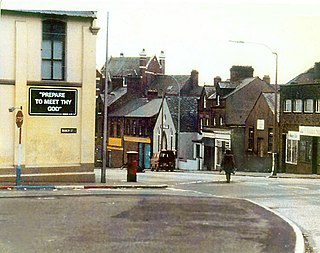
An ammunition technical officer (ATO) is an officer involved in all aspects of the army, air force, and navy's use of ammunition. This includes: bomb disposal, clearance of ERW, explosives accident investigation, procurement, in service management, storage, and inspection and repair.
The role of the Commando Logistic Regiment (CLR), Royal Marines is to provide second line Combat Service Support to 3 Commando Brigade.

Marine Aviation Logistics Squadron 16 (MALS-16) is an aviation logistics support unit of the United States Marine Corps. Known as the Immortals, they are currently based at Marine Corps Air Station Miramar and fall under the command of Marine Aircraft Group 16 (MAG-16) and the 3rd Marine Aircraft Wing.
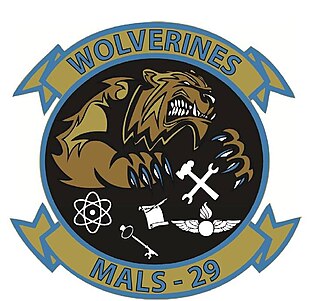
Marine Aviation Logistics Squadron 29 (MALS-29) is an aviation logistics support unit of the United States Marine Corps. Known as the "Wolverines", they fall under the command of Marine Aircraft Group 29 and the 2nd Marine Aircraft Wing and are currently based at Marine Corps Air Station New River. MALS 29 supports multiple types of aircraft and provides detachments to aviation combat elements operating globally in support the United States National Defense Strategy.
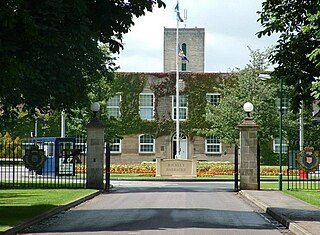
Buckley Barracks is a British Army barracks in Wiltshire, England, about 4+1⁄2 miles (7 km) north of Chippenham and 15 miles (24 km) west of Swindon. It is set to close in 2029.
This is the Operation Herrick ground order of battle, which lists any British ground forces that have taken part in the duration of Operation Herrick between 2002 and 2014.
156 Regiment RLC is an Army Reserve Regiment of the British Army's Royal Logistic Corps.
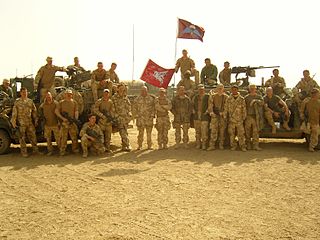
15 Air Assault Support Squadron is a British Army logistic squadron, currently under 13 Air Assault Support Regiment RLC.
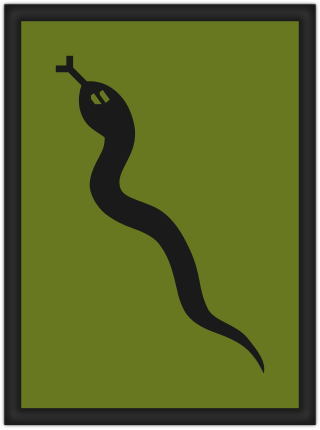
101st Operational Sustainment Brigade is a logistic brigade within 3rd Division of the British Army, formed from the Combat Service Support Group in 1999. The brigade is held in high readiness and is described as a "vanguard support brigade".
6 Regiment Army Air Corps is the sole Army Reserve regiment of the British Army Air Corps (AAC) falling under the Combat Arm of the British Army. The regiment consists of five Squadrons based around the south of the UK. 6 Regiment provides soldiers trained to assist Joint Helicopter Command on exercise and operations both in the UK and worldwide. The regiment provides support to support and attack helicopter in roles including Aviation Ground crew specialists, Aviation Communication Operators and Aviation Support Officers. The AAC regiment is supported by other Army Reserve elements including Royal Logistic Corps as chefs, Logistics and Supply, Adjutant General Corps as human resource specialists and Royal Army Medical Corps in the form of Combat Medical Technicians.

The Duke of Gloucester Barracks is a British Army barracks at South Cerney in Gloucestershire.
6 Regiment RLC is a regiment of the Royal Logistic Corps of the British Army.
7 Regiment RLC is a regiment of the British Army's Royal Logistic Corps.
9 Regiment RLC is a regiment of the British Army's Royal Logistic Corps.

17 Port and Maritime Regiment is a regiment of the British Army's Royal Logistic Corps. The unit is the Army's only regular Port & Maritime capability, though it is twinned with 165 Port and Maritime Regiment RLC, of the Army Reserve.
Operation Gabriel was the codename for the British military contribution in Rwanda as part of the UN Assistance Mission for Rwanda UNAMIR during the Rwandan genocide. British soldiers were deployed to Rwanda as part of a wider peacekeeping force that aimed to control the effects of the ongoing conflict and resulting genocide. British troops arrived in the country in August after just five days preparation, starting with a 60-strong advance group that aimed to repair infrastructure damaged by the conflict in the region, and to prepare for a mass evacuation of British civilians from the region. Six hundred troops followed the initial advance party shortly after, and contained elements from both Army and RAF logistics, support and infantry personnel. British troops were withdrawn in November 1994.
3 Regiment RLC was a regiment of the British Army's Royal Logistic Corps. It was disbanded as part of the Future Soldier reforms.











